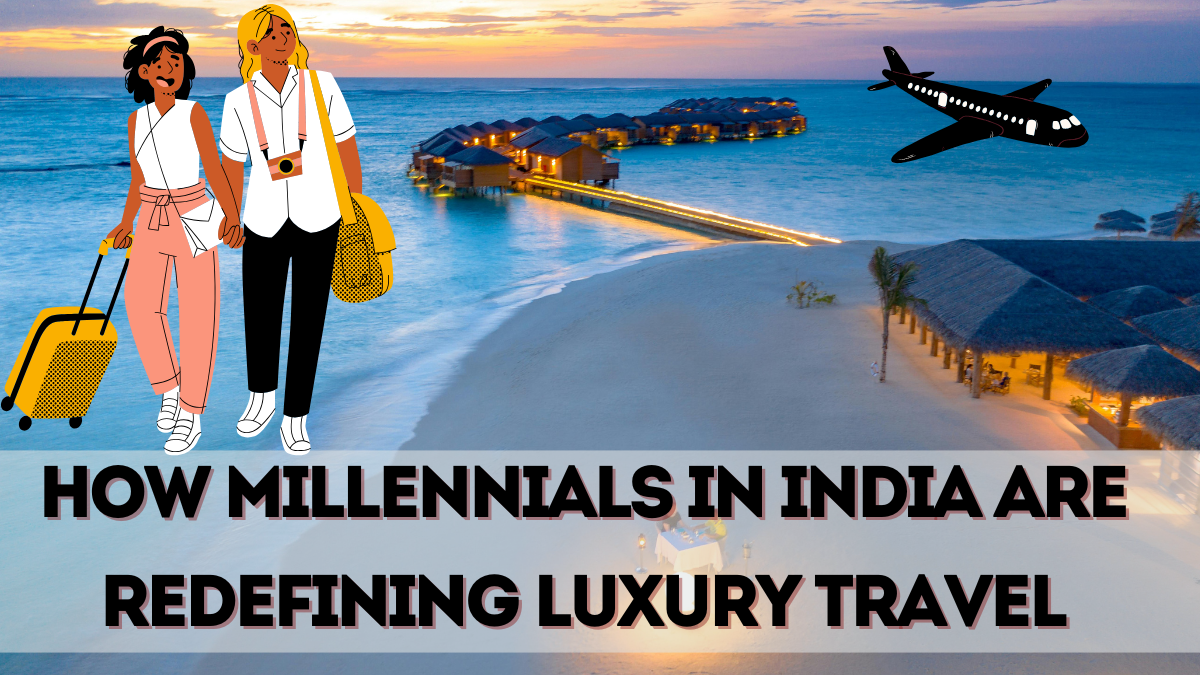The concept of luxury travel in India has undergone a dramatic transformation in recent years. Unlike traditional luxury that focused mainly on five-star hotels, fine dining, and lavish shopping, today’s millennials are rewriting the rules. In 2025, the trend of millennials redefining luxury travel India 2025 reflects a shift towards personalized, experience-driven, and socially responsible tourism. For Indian millennials, luxury is no longer just about material comforts but about creating unique stories and memories that last a lifetime.
This shift is reshaping the Indian travel industry, with airlines, hotels, and tour operators adapting to new demands. Millennials, who represent nearly 35% of India’s traveling population, have become the biggest drivers of change. Their preferences are setting new benchmarks for how luxury vacations are defined and consumed in India.

What Luxury Travel Means to Millennials in 2025
For millennials, luxury is not about extravagance alone. Instead, it is about value, uniqueness, and personalization. While previous generations associated luxury with expensive hotels and first-class travel, millennials prioritize experiences such as:
-
Exploring hidden destinations away from crowds.
-
Staying in boutique hotels or eco-resorts rather than conventional chains.
-
Choosing curated dining experiences over generic buffets.
-
Investing in adventure travel like scuba diving, trekking, or wildlife safaris.
-
Seeking wellness and mindfulness retreats that combine relaxation with inner growth.
This evolution means that luxury is now more about quality experiences than just high-end price tags.
Top Luxury Travel Trends Among Indian Millennials in 2025
The Indian travel trends 2025 highlight some fascinating shifts driven by millennials:
-
Experience Over Possessions
-
Millennials prefer spending on unique travel experiences rather than luxury items. A trek in the Himalayas or a homestay in Ladakh is valued more than a branded handbag.
-
-
Eco-Conscious Travel
-
Environmental awareness plays a huge role. Millennials are choosing eco-lodges, electric vehicle rentals, and sustainable resorts that minimize carbon footprints.
-
-
Wellness Tourism
-
Yoga retreats in Rishikesh, Ayurveda treatments in Kerala, and meditation camps in Goa are increasingly seen as luxury choices.
-
-
Adventure and Exploration
-
Activities like paragliding in Bir-Billing, diving in the Andamans, and camping in the Thar Desert are highly popular among young travelers.
-
-
Tech-Enhanced Luxury
-
From AI-powered booking apps to VR previews of hotels, millennials integrate technology at every stage of travel.
-
These patterns demonstrate how luxury vacations millennials are redefining priorities for the industry.
Popular Destinations for Millennial Luxury Travelers
Indian millennials are not just traveling within India but also exploring international locations with new preferences. Some of the top choices in 2025 include:
-
Domestic: Rishikesh, Coorg, Kashmir, Sikkim, and Rajasthan’s boutique heritage stays.
-
International: Bali, Vietnam, Greece, Japan, and Iceland for unique experiences.
Unlike previous generations who preferred long foreign holidays, millennials are opting for short but frequent trips with immersive experiences.
Spending Habits of Indian Millennials
Millennials are willing to spend more on meaningful experiences, with average luxury trip spending ranging between ₹1.5 lakh and ₹5 lakh. However, they balance expenses by looking for deals online, using credit card reward programs, and booking through travel apps. Their spending patterns reveal:
-
High budgets for activities like skydiving or guided cultural tours.
-
Moderate budgets for accommodation, with a preference for boutique and mid-luxury stays.
-
Low budgets for shopping, as experiences matter more than souvenirs.
The focus is on value for money, making them savvy yet adventurous travelers.
How the Travel Industry Is Adapting
The travel and hospitality industry in India has quickly recognized these changes and is adapting to suit millennial demands:
-
Boutique hotels and homestays are expanding rapidly in urban and rural locations.
-
Airbnb and luxury villa rentals are gaining popularity over traditional hotel stays.
-
Luxury travel agencies now offer curated experiences, such as food trails, cultural tours, and adventure packages.
-
Airlines and OTAs provide flexible booking, last-minute deals, and tech-integrated services.
This shift has created a competitive environment where businesses must deliver authentic and personalized services to win millennial travelers.
Why This Trend Matters
The redefinition of luxury travel by millennials has long-term implications for Indian tourism. It encourages sustainable development, supports local communities, and pushes businesses to innovate. By moving away from traditional definitions of luxury, millennials are making travel more inclusive and diverse. Their preferences are shaping the future of not just domestic tourism but also India’s position in the global travel market.
Final Thoughts
The millennials redefining luxury travel India 2025 trend shows that luxury today is more about personalized experiences, sustainability, and meaningful journeys. Indian millennials are reshaping how travel is perceived by choosing quality, authenticity, and adventure over extravagance. For the industry, adapting to these shifts is essential to remain relevant in a competitive market. For travelers, it opens doors to a new definition of luxury—one that is rich in experience, memory, and cultural value.
FAQs
What do Indian millennials consider luxury travel in 2025?
They define luxury as unique, personalized experiences such as eco-stays, adventure activities, and wellness retreats rather than only five-star hotels.
Which destinations are most popular for millennial luxury travelers?
Domestic favorites include Rishikesh, Sikkim, and Rajasthan, while international picks include Bali, Iceland, and Japan.
Are millennials willing to spend more on luxury travel?
Yes, they spend generously on experiences and activities, but balance it with budget-conscious accommodation and travel deals.
How is the industry adapting to millennial travel habits?
Hotels, airlines, and agencies are focusing on personalization, eco-tourism, boutique stays, and tech-driven services.
Why is sustainability important in millennial luxury travel?
Millennials are highly eco-conscious, and they prefer travel that minimizes environmental impact while supporting local communities.
Click here to know more.
